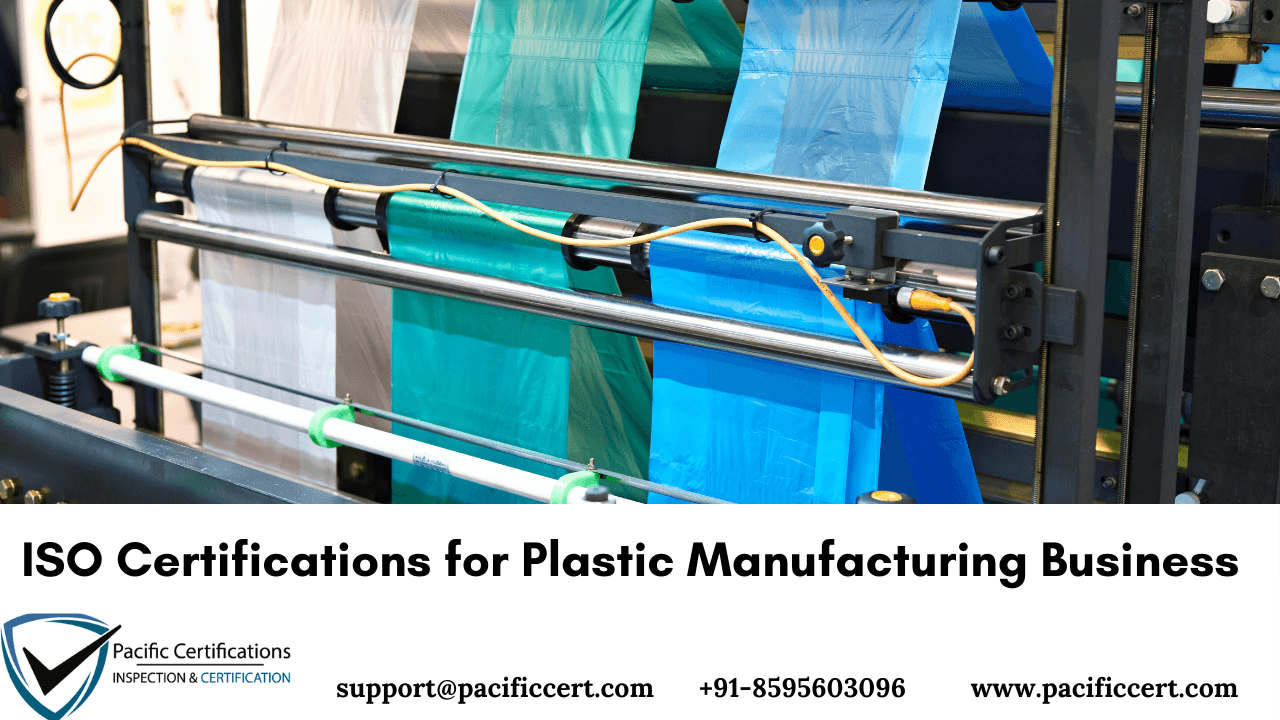ISO Certifications for Plastic Manufacturing Businesses, Requirements and Benefits

Introduction
Plastic manufacturing businesses operate in a compliance-sensitive and environmentally scrutinized industrial environment. From raw material compounding and extrusion to injection molding, blow molding, thermoforming, finishing, and packaging, plastic manufacturers must maintain tight control over material properties, production parameters, quality consistency, and waste handling. Defects, contamination, inconsistent batches, or process deviations can result in rejected lots, customer complaints, regulatory action, and costly recalls—especially in sectors such as packaging, automotive, medical devices, construction, and consumer goods.
At the same time, plastic manufacturers face growing pressure from regulators, brand owners, and global buyers regarding environmental impact, worker safety, energy consumption, traceability, and data governance. Regulations around waste reduction, emissions, chemical usage, and occupational health are tightening across major markets. Customers increasingly require suppliers to demonstrate structured management systems as part of supplier qualification. ISO certifications provide plastic manufacturing businesses with internationally recognized frameworks to manage these risks, improve operational discipline, and demonstrate compliance across the full production lifecycle.
Quick Summary
ISO certifications such as ISO 9001, ISO 14001, ISO 45001, ISO 50001, and ISO/IEC 27001 help plastic manufacturing businesses establish controlled, compliant, and efficient production systems. These standards support consistent product quality, effective environmental management, worker health and safety, energy efficiency, and protection of sensitive operational data. ISO certification enables plastic manufacturers to meet regulatory requirements, reduce waste and energy consumption, improve workplace safety, and strengthen credibility with OEMs, exporters, and global supply chain partners.
In manufacturing industries, consistency and control define long-term credibility.
Quick Summary
ISO certifications help plastic manufacturing businesses establish structured systems to manage quality control, environmental impact, occupational health and safety, energy efficiency, information security, and business continuity. Standards such as ISO 9001, ISO 14001, ISO 45001, ISO 50001, ISO/IEC 27001, ISO 22301, and ISO 55001 are widely applicable across plastic processing operations, supporting regulatory compliance, customer confidence, and sustainable growth.
For ISO certification enquiries related to plastic manufacturing operations, contact [email protected]
Key ISO Standards for Plastic Manufacturing
Plastic manufacturers can benefit from several ISO standards, each focusing on different aspects of manufacturing. Here are the most critical ones:
ISO 9001: Quality Management System (QMS)
ISO 9001 establishes structured quality control across plastic manufacturing processes such as raw material inspection, formulation control, molding parameters, finishing, and dispatch. It ensures consistency in product specifications, dimensional accuracy, and performance characteristics required by customers. For plastic manufacturers serving regulated or export markets, ISO 9001 strengthens traceability, defect management, and customer satisfaction.
ISO 14001: Environmental Management System (EMS)
ISO 14001 enables plastic manufacturers to systematically manage environmental aspects such as polymer waste, scrap generation, emissions, wastewater, and chemical storage. It supports compliance with environmental regulations and promotes waste reduction, recycling, and responsible resource use. Given increasing scrutiny on plastic pollution and sustainability, ISO 14001 is critical for regulatory alignment and market acceptance.
ISO 45001: Occupational Health and Safety Management System (OHSMS)
ISO 45001 focuses on managing workplace hazards associated with plastic manufacturing, including high-temperature processes, rotating machinery, manual handling, and exposure to fumes or additives. It requires hazard identification, risk assessment, and implementation of preventive controls involving employees and contractors. The standard supports reduction of injuries, machine-related incidents, and occupational health risks.
ISO 50001: Energy Management Systems
ISO 50001 addresses the high energy consumption of plastic manufacturing equipment such as extruders, injection molding machines, compressors, and chillers. It helps organizations monitor energy usage, establish performance baselines, and improve efficiency through operational and technological improvements. Energy management is directly linked to cost control and emissions reduction targets.
ISO 27001: Information Security Management Systems (ISMS)
ISO/IEC 27001 protects sensitive information such as customer drawings, formulations, ERP data, and production records used in plastic manufacturing operations. It addresses risks related to cyber incidents, unauthorized access, and data loss. As manufacturers increasingly adopt digital systems and automation, information security has become operationally significant.
ISO 22301:2019 – Business Continuity Management Systems
ISO 22301 ensures plastic manufacturing operations can continue during disruptions such as equipment breakdowns, power failures, supply shortages, or cyber incidents. It requires business impact analysis, recovery planning, and testing. For manufacturers operating on tight delivery schedules, this standard supports reliability and customer confidence.
ISO 55001:2014 – Asset Management Systems
ISO 55001 provides a lifecycle-based approach to managing critical manufacturing assets such as molds, extrusion lines, presses, utilities, and tooling. It emphasizes asset integrity, preventive maintenance, and performance optimization. Effective asset management reduces downtime, improves quality consistency, and supports long-term capital efficiency.
What are the requirements of ISO Certifications for Plastic Manufacturing Businesses?
To achieve ISO certification, plastic manufacturers must implement structured systems for quality, safety, and sustainability, supported by documentation and continuous improvement. Below are the key requirements:
Define the scope of manufacturing operations, from raw material sourcing to finished products.
Establish quality, environmental, and safety policies with management accountability.
Conduct risk assessments for chemical handling, production hazards, and environmental impact.
Implement documented processes for material testing, production monitoring, and product traceability.
Train staff in occupational safety, waste management, and quality control procedures.
Maintain records of inspections, audits, supplier assessments, and corrective actions.
Monitor performance indicators such as defect rates, energy usage, and waste generation.
Carry out internal audits and management reviews to verify compliance and drive improvements.
Specific requirements:
ISO 9001:2015 – Quality Management Systems Requirements
Define standardized production and inspection procedures
Control raw material and supplier quality
Implement in-process and final product inspections
Manage non-conforming products and corrective actions
Monitor quality performance and customer feedback
ISO 14001:2015 – Environmental Management Systems Requirements
Identify environmental aspects such as waste, emissions, and chemicals
Ensure compliance with environmental regulations
Implement waste segregation and recycling controls
Monitor environmental performance indicators
Establish emergency response for spills or releases
ISO 45001:2018 – Occupational Health and Safety Management Requirements
Identify machine and process-related hazards
Conduct risk assessments and implement controls
Train workers on safe operating procedures
Investigate incidents and near misses
Engage employees in safety management
ISO 50001:2018 – Energy Management Systems Requirements
Identify significant energy-consuming equipment
Establish energy performance baselines
Monitor and analyze energy usage
Implement efficiency improvement actions
Review energy performance at management level
ISO/IEC 27001:2022 – Information Security Management Requirements
Identify and classify information assets
Control access to systems and data
Manage cybersecurity risks and incidents
Secure third-party access
Conduct regular risk assessments
ISO 22301:2019 – Business Continuity Management Requirements
Identify critical production activities
Assess disruption risks
Define recovery strategies
Test continuity plans
Maintain stakeholder communication
ISO 55001:2014 – Asset Management Systems Requirements
Maintain asset registers and criticality analysis
Implement preventive maintenance programs
Monitor asset performance and downtime
Control changes impacting assets
Align asset objectives with business goals
Implementation Tip: Start with ISO 9001 and ISO 14001 to build strong quality and sustainability systems, then add ISO 45001 and sector-specific standards like ISO 22000 or ISO 13485 depending on applications.
For ISO certification enquiries related to plastic manufacturing businesses, contact [email protected].
What are the benefits of ISO Certifications for Plastic Manufacturing Businesses?
ISO certification provides a range of benefits to plastic manufacturers:
ISO 9001 ensures that plastic products meet stringent quality standards, reducing defects and enhancing customer trust.
ISO 14001 promotes the use of sustainable materials and processes, reducing the ecological footprint of plastic production.
ISO 45001 helps create safer work environments by identifying potential hazards and implementing control measures.
ISO-certified companies can compete in international markets, where certification is often a requirement for doing business.
Standards like ISO 50001 help reduce energy consumption, leading to lower operational costs.
The global plastics market is projected to exceed USD 750 billion by 2030, driven by demand from packaging, automotive, construction, healthcare, and electronics sectors. At the same time, regulators are tightening controls on plastic waste, emissions, and chemical usage, while brand owners are imposing stricter sustainability and supplier compliance requirements. Energy costs and efficiency have also become major concerns due to energy-intensive processing operations.
By 2030, plastic manufacturers are expected to operate under significantly higher scrutiny related to environmental performance, traceability, and operational transparency. Buyers increasingly require ISO-certified management systems as part of supplier qualification and long-term contracts. ISO certifications are therefore becoming a commercial and regulatory expectation for professionally managed plastic manufacturing businesses.
ISO Certification cost for Plastic Manufacturing
The cost of ISO certification varies based on the size of the company, the complexity of operations, and the number of locations. Plastic manufacturers must consider both the initial certification cost and ongoing expenses related to audits and maintaining compliance.
To get a quote, contact us at [email protected]
Customer Satisfaction and ISO Certification
ISO certification helps manufacturers meet regulatory requirements and improves customer satisfaction. Standards such as ISO 9001 ensure that products are consistent in quality, which leads to fewer defects, faster production times, and enhanced customer loyalty.
ISO certification is a valuable asset for plastic manufacturing businesses, providing a structured framework for quality management, safety, and environmental sustainability.
With these international guidelines companies can improve their improve operational efficiency, increase customer satisfaction, and gain access to global markets. Investing in ISO certification ensures compliance & fosters a culture of continuous improvement, positioning plastic manufacturers for long-term success.
How Pacific Certifications Can Help?
Pacific Certifications, accredited by ABIS, provides independent and internationally accepted ISO audit and certification services for plastic manufacturing businesses, including injection molding, extrusion, blow molding, compounding, recycling, and packaging operations. With experience in manufacturing-driven and compliance-focused sectors, We help organizations in demonstrating conformity to global management system standards.
Pacific Certifications can support plastic manufacturers by:
Conducting independent audits for ISO 9001, ISO 14001, ISO 45001, ISO 50001, ISO/IEC 27001, and other applicable ISO standards
Issuing ABIS-accredited ISO certificates recognized by OEMs, exporters, regulators, and international buyers
Supporting integrated management system certification, allowing multiple ISO standards to be combined under a single audit program
Auditing single-site and multi-site manufacturing facilities, including production plants, warehouses, and recycling units
Ensuring a structured, impartial, and compliant certification process aligned with ISO/IEC 17021 requirements
Contact Us
For ISO certification inquiries for plastic manufacturing businesses, contact [email protected]or +91-8595603096.
Author: Sony
Read more: Pacific Blogs

